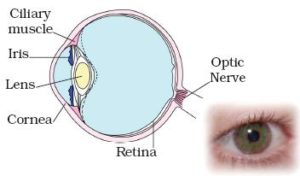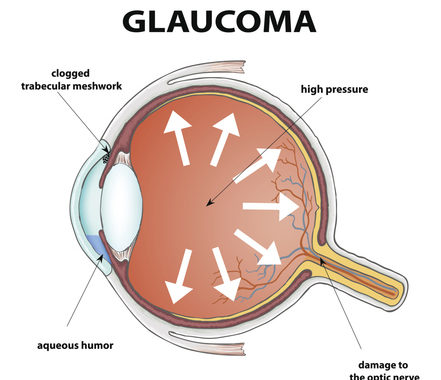Can glaucoma be cured naturally? If you are afraid of eye surgeries or don’t have much luck with eye drops and pills, read on…
Dr. Bates wrote in his article in 1920 after healing many worst cases of glaucoma, “The truth about glaucoma is that it is a functional neurosis caused by strain, and as such is curable.” Many of his patients healed from glaucoma and regained full vision back by practicing simple and easy natural vision improvement techniques.
As you’d agree, the eye is a very important part of the body. Address warning signs of glaucoma, as listed below, with your ophthalmologist before they become irreversible.
What Is Glaucoma?
Glaucoma is an eye disease of the optic nerve, where the optic nerve at the back of the eye is damaged. When a significant number of optic nerve fibers are damaged, blind spots develop in the field of vision. If the entire optic nerve is destroyed, blindness results.
Types of glaucoma
- Open-angle glaucoma is more common. It happens when the meshwork, which acts as a filter for the aqueous fluid between the lens and cornea gets clogged or obstructed and does not filter the fluid efficiently, leading to high ocular pressure. It causes a gradual loss of peripheral vision.
- Closed-angle glaucoma is considered to be an ocular emergency. It happens when the meshwork in the eye is completely blocked and pressure builds up fast. The symptoms include sudden loss of vision, sudden hazy or red eye, vision halos, pain with vomiting, etc.
How glaucoma affects eyesight
The optic nerve carries light rays in the form of electrical impulses from the retina to the vision centers of the brain. The brain then makes the image out of the visual information it received from the optic nerve. Therefore, when you have damaged optic nerve, it impacts your eyesight because it can no longer carry visual information to the brain.
Main Factors for Glaucoma

The general belief is that glaucoma is caused by high IntraOcular pressure (IOP), but there are other factors which cause glaucoma. They are poor blood circulation, and weakness of the optic nerve.
1. What’s with intraocular pressure?
Glaucoma is often caused by increased pressure in the aqueous fluid that circulates in the inside of the eye between the cornea and the lens. In fact, most eye drops, pills, and laser procedures performed for glaucoma is to reduce the intraocular pressure. However, high eye pressure alone does not mean that you have glaucoma. Many people can also develop glaucoma with normal or low eye pressure if their optic nerve is damaged or destroyed.
Eye pressure is measured in millimeters of mercury (mm Hg). Normal eye pressure ranges from 12-22 mm Hg, and eye pressure of greater than 22 mm Hg is considered higher than normal. When the pressure is higher than normal but the person does not show any optic nerve damage or vision loss, this is referred to as ocular hypertension, which ophthalmologist often call “glaucoma suspect.”
As a side note, for people who had LASIK surgery, it’s difficult to measure and also determine what the normal eye pressure should be, because the thickness of the cornea has reduced. Therefore, the normal eye pressure range can be subjective. In fact, some say normal eye pressure is from 10-21 mm Hg whereas some others say it’s 12-25 mm Hg.
Increased intraocular pressure can result from possible causes listed below in this article.
Is slight changes in eye pressure normal? – What to avoid before the IOP test
Slight changes in eye pressure from one season to another or even during the course of a day are normal.
According to the JNMA Ophthalmology journal, Tonometry (used to measure IOP) in tense individuals often cause a slight elevation of IOP. This could be associated with apprehension, self-protective tendency, or reflecting fear.
Changes in intraocular pressure can be caused by pupil dilating drops, anatomical problems, inflammation of the eye after trauma or infection, and medication use. Intraocular pressure also varies with changes in heart rate or respiration, and may also be affected by exercise and fluid intake.
Alcohol consumption and caffeine use also cause temporary changes in intraocular pressure, as can coughing, vomiting, or straining to lift heavy objects.
Avoid the above mentioned before you go get your IOP measured!
2. Poor blood circulation matters in developing glaucoma
Chronically poor blood circulation to the optic nerve weakens their nerve fibers. It’s because blood carries oxygen and nutrients to the optic nerve. Just like any other body parts, optic nerve can also starve to death from the lack of nutrition and loses its strength. People who have diabetes or Alzheimer’s Disease have higher risk of glaucoma because their blood circulation tends to be poor.
3. Weakness of your optic nerve matters in glaucoma
If you have strong optic nerve, you might not develop glaucoma even with high eye pressure. On the other hand, if you have weak optic nerve, you could develop glaucoma even with normal or low eye pressure. When the pressure is normal and yet the optic nerve is degenerated and destroyed, then you have what’s called low-tension glaucoma.
What weakens and damages the optic nerve?
If you look through the possible causes for glaucoma listed below in this article, you’ll see that all of these causes could produce any of the following, resulting in weakened or damaged optic nerve fibers:
- Poor blood flow, thus lack of oxygen and nutrients to the optic nerve
- Toxins, heavy metals
- Radiation
- Trauma
- Disease of the central nervous system – the brain and the spinal cord
- Methanol found in home-brewed alcohol
- Ocular inflammation and pressure
- Bad emotions and mental strain

Glaucoma is a leading cause of blindness in the world, especially in older people. Understanding what could cause glaucoma is important, as well as be monitored regularly by your ophthalmologist to detect the early signs of damage to the optic nerve, especially if you experience any of the following symptoms.
Initial Symptoms
Glaucoma is dangerous in that symptoms are typically missing until you notice a loss in peripheral vision, or until your ophthalmologist examines your eyes thoroughly.
When the optic nerve fibers become weak or damaged, the first symptom you experience is gradual loss of peripheral vision. Blurred vision along with headache especially in the dark or upon awakening could be other initial symptoms of glaucoma.
Warning symptoms
- Unusual trouble adjusting to dark rooms
- Difficulty focusing on near or distant objects
- Squinting or blinking due to unusual sensitivity to light or glare
- Change in color of iris
- Red-rimmed, encrusted or swollen lids
- Recurrent pain in or around eyes
- Double vision
- Dark spot at the center of viewing
- Lines and edges appear distorted or wavy
- Excess tearing or “watery eyes”
- Dry eyes with itching or burning
- Seeing spots, ghost-like images
Potentially serious signs that require immediate medical attention
- Sudden loss of vision in one eye
- Sudden hazy or blurred vision
- Flashes of light or black spots
- Halos or rainbows around light


The exact causes of optic nerve damage from glaucoma is not fully understood. However, the researchers found that it involves mechanical compression of nerve fibers and/or restricted blood flow to the optic nerve. Some of the possible causes that could induce elevated intraocular pressure and/or damage the optic nerve are listed below:
- Poor blood circulation
- Steroid use
- Other harmful drugs for glaucoma include cancer drugs, NSAIDs, antidepressants, sedatives, stimulants, antihistamines, decongestants, etc. Click here for more info on harmful drugs for glaucoma.
- Therapies used for psychiatric disorders – both medical and electroconvulsive therapy
- Chronic near-point stress or myopia (the bulging of the lens against the iris restricts the flow of liquid into the anterior chamber and impede drainage through Schlemm’s canal.)
- Injuries to the eye and other eye diseases such as cataract
- Brain tumors
- Heart problem
- Diabetes
- Autoimmune disease
- History of severe anemia
- Sleep apnea
- Smoking
- Excessive sugar consumption (Sugar weakens and inflames tissues & blood vessels)
- High levels of mercury
- Retinal vein occlusion
- Swollen optic nerve or inflammation of the eye cells
- Emotional shock or stress
Medical Treatment and Side Effects
The treatment for glaucoma depends upon the nature and severity of each case. In general, your ophthalmologist will use eye drops, pills, laser procedures, or surgical operations in an attempt to prevent or slow further damage from occurring.
It is important to tell all of your doctors about the eye medications you are using because glaucoma medications can have side-effects. You should notify your ophthalmologist immediately if you think you may be experiencing side-effects. Side-effects from some eye drops may include a stinging sensation, red eyes, blurred vision, headaches, or changes in pulse, heartbeat or breathing. Side-effects from pills may include tingling of fingers and toes, drowsiness, loss of appetite, bowel irregularities, kidney stones, anemia or bleeding disorders. — from kelloggeye.org
For more details on medical treatment of glaucoma, go here…
How to Prevent Glaucoma
Here are great natural ways to prevent glaucoma.
Healing Glaucoma Holistically – in early stage

More than 100 years ago, Dr. Bates, an ophthalmologist in NY city, cured many serious cases of glaucoma using his natural vision techniques, which he didn’t think it was possible until he tried them after surgeries and medications didn’t work.
Nowadays, … read more on how to heal glaucoma holistically here….
With love and seeing,
Mimi Shekoski, PhD, Natural Vision Teacher | Holistic Natural Health Doctor
References:
http://glaucomatoday.com/2014/02/glaucoma-associated-with-therapies-for-psychiatric-disorders/ http://jamanetwork.com/journals/jamaophthalmology/article-abstract/627675 https://www.reviewofoptometry.com/ce/meds-that-dont-mix-with-glaucoma-patients “Vision for life” written by Meir Schneider, PhD “Better Eyesight – The Complete Magazines of William H. Bates”, compiled by Tom Quackenbush

Good blog! I really love how it is simple on my eyes and the data are well written. I’m wondering how I could be notified whenever a new post has been made. I’ve subscribed to your feed which must do the trick! Have a great day!
What youre saying is completely true. If I could write like you I would start my own blog.
I enjoy the comments on this web site, it really gives it that community experience!
Your style is really unique in comparison to other people I have read stuff from.
Thank you for posting when you have the opportunity, Guess
I’ll just bookmark this blog.
Awesome article.
Very nice post. I certainly love this site. Thanks!
Way cool! Some extremely valid points! I appreciate you
writing this article and also the rest of the site is
also very good.
Hello mates, its impressive paragraph about educationand completely explained, keep it up all the time.
Hello! I just would like to give a huge thumbs up for the great info you have here on this post. I will be coming back to your blog for more soon.
I have to thank you for the efforts you have put in penning this blog.
I really hope to check out the same high-grade content by you in the future
as well. In truth, your creative writing abilities has
inspired me to get my own blog now 😉
I really can’t believe how great this site is. Keep up the good work. I’m going to tell all my friends about this place.
I simply want to say I am beginner to weblog and really enjoyed this blog site. Very likely I’m likely to bookmark your site . You absolutely come with remarkable stories. Thanks for sharing with us your web-site.
Ԍreetings! I’ve been гeading youг weblog for a long time now and finally got the bravery to go ahead ɑnd give you a shout out from Huffman Tx!Just wanted to teⅼl yoᥙ keep up the exceⅼlent job!
This is very interesting, You are a very skilled blogger. I have joined your feed and look forward to seeking more of your fantastic post. Also, I’ve shared your web site in my social networks!
I am just starting to learn about all of this. Thanks!
I am just starting to learn about all of this. Thanks!
Spot on with this write-up, I honestly think this website needs far
more attention. I’ll probably be back again to read more, thanks for the advice!
Very interesting points you have remarked, thanks for putting up.
“Wonderful work! This is the kind of information that are meant to be shared around the internet. Disgrace on Google for now not positioning this put up higher! Come on over and seek advice from my website . Thank you =)”
139202 10030whoah this blog is great i love reading your articles. 772987
magnificent issues altogether, you just gained a emblem new reader. What may you recommend about your publish that you made some days ago? Any certain?
“Greetings! Very helpful advice within this post! It is the little changes which will make the greatest changes. Thanks for sharing!”
I’ve been absent for some time, but now I remember why I used to love this site. Thank you, I will try and check back more frequently. How frequently you update your website?
I used to be recommended this web site by my cousin. I am not certain whether this submit is written through him as nobody else recognize such particular approximately my problem. You are incredible! Thank you!
Peculiar article, exactly what I wanted to find.
Thank you for the good writeup. It in fact was a amusement account it. Look advanced to more added agreeable from you! However, how could we communicate?
Hiya! I know this is kinda off topic but I’d figured I’d ask. Would you be interested in exchanging links or maybe guest authoring a blog article or vice-versa? My blog goes over a lot of the same subjects as yours and I believe we could greatly benefit from each other. If you might be interested feel free to shoot me an e-mail. I look forward to hearing from you! Excellent blog by the way!
I couldn’t refrain from commenting. Perfectly written!